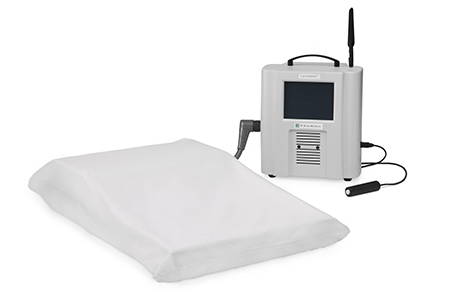
Patients with moderate heart failure have a new option to help manage their chronic disease and reduce their chance of being readmitted to a hospital. Cardiologists on the medical staff at Baylor Jack and Jane Hamilton Heart and Vascular Hospital recently implanted a new miniaturized, wireless heart monitoring sensor that's designed to communicate with a "smart pillow" and then transmit critical information to a clinician on a regular basis. The implantable, miniaturized monitor, smart pillow and home monitoring unit comprise the FDA-approved heart monitoring system.
Heart failure occurs when the heart is unable to pump enough blood to meet the body's demands. According to the Centers for Disease Control and Prevention, more than 5.1 million Americans have heart failure, with 670,000 new cases diagnosed each year. Patients with heart failure face frequent hospitalizations, a reduced quality of life and a higher risk of death.
Typically, heart failure patients must carefully monitor their weight and blood pressure to avoid build-up of fluids around the heart. Elevations in weight and blood pressure often indicate the patient's heart failure is worsening. Physicians must adjust medications as symptoms increase, but patients may not take action quickly enough, leading to a hospital readmission.
"Even with good medications and appropriate dietary monitoring, patients can decompensate," says Shelley Hall, MD, chief of transplant cardiology, mechanical circulatory support and heart failure, Baylor University Medical Center at Dallas. "When this occurs, many heart failure patients experience excess fluid, high blood pressure, and inflammation. Patients may wait until a situation is nearly critical to seek help and may end up seeking emergency care. Monitoring conditions daily is a part of a proactive treatment plan for heart failure patients."
New Device Offers Different Approach
The CardioMEMS™ Heart Failure System, first implanted by cardiologists at Baylor Heart and Vascular Hospital on Tuesday, Sept. 15, gives heart failure patients another way to monitor their condition.
During a surgical procedure, the team first implants the miniaturized, wireless monitor into the patient's pulmonary artery (PA). After the device is implanted, the patient receives the smart pillow and an electronic unit for home.
Through education provided at the hospital, the patient learns the importance of lying on the smart pillow at approximately the same time daily. The patient presses a button on his or her external monitoring unit, and listens for the pillow to "speak;" indicating that readings are successfully occurring.
The smart pillow communicates via safe radio-frequency to the device implanted into the patient's pulmonary artery. The implant has a micro-electronic medical system, or "MEMS" for short. Once the readings are finished, typically two to three minutes, the pillow tells the patient that the reading is finished.
The CardioMEMS Heart Failure System allows patients to transmit critical information about their heart failure status to a clinician on a regular basis, without the need for additional clinic or hospital visits. By monitoring their condition daily with this remote technology, patients can alert their physician before their worsening condition requires a hospital stay.
In June 2015, Scott & White Memorial Hospital – Temple became the first Baylor Scott & White facility to implant the CardioMEMS™ device. Baylor Scott & White Medical Center – Irving also plans to offer this option in the near future.
Notice Regarding Physician Ownership: Baylor Jack and Jane Hamilton Heart and Vascular Hospital is a hospital in which physicians have an ownership or investment interest. The list of the physician owners or investors is available to you upon request. Physicians are members of the medical staff at one of Baylor Health Care System's subsidiary, community or affiliated medical centers and are neither employees nor agents of those medical centers, Baylor Jack and Jane Hamilton Heart and Vascular Hospital or Baylor Health Care System.
# # #
MEDIA CONTACT:
Susan Hall
susanh@baylorhealth.edu
(214) 820-1817
About Baylor Scott & White Health
As the largest not-for-profit health system in the state of Texas, Baylor Scott & White is empowering customers to live well by reimagining traditional healthcare — creating more convenient, personalized and informed experiences. It serves more than three million customers through 53 hospitals, including flagship academic medical centers in Dallas, Fort Worth and Temple; the Baylor Scott & White Research Institute; 1,300+ access points; 59,000+ team members; and its leading digital platform — MyBSWHealth. The system's award-winning employer solutions include Baylor Scott & White Health Plan, Baylor Scott & White Quality Alliance and Levanto — a company offering digitally enabled health products. Founded as a Christian ministry of healing more than a century ago, Baylor Scott & White's mission is to promote the health and well-being of all individuals, families and communities. For more information, visit: BSWHealth.com

